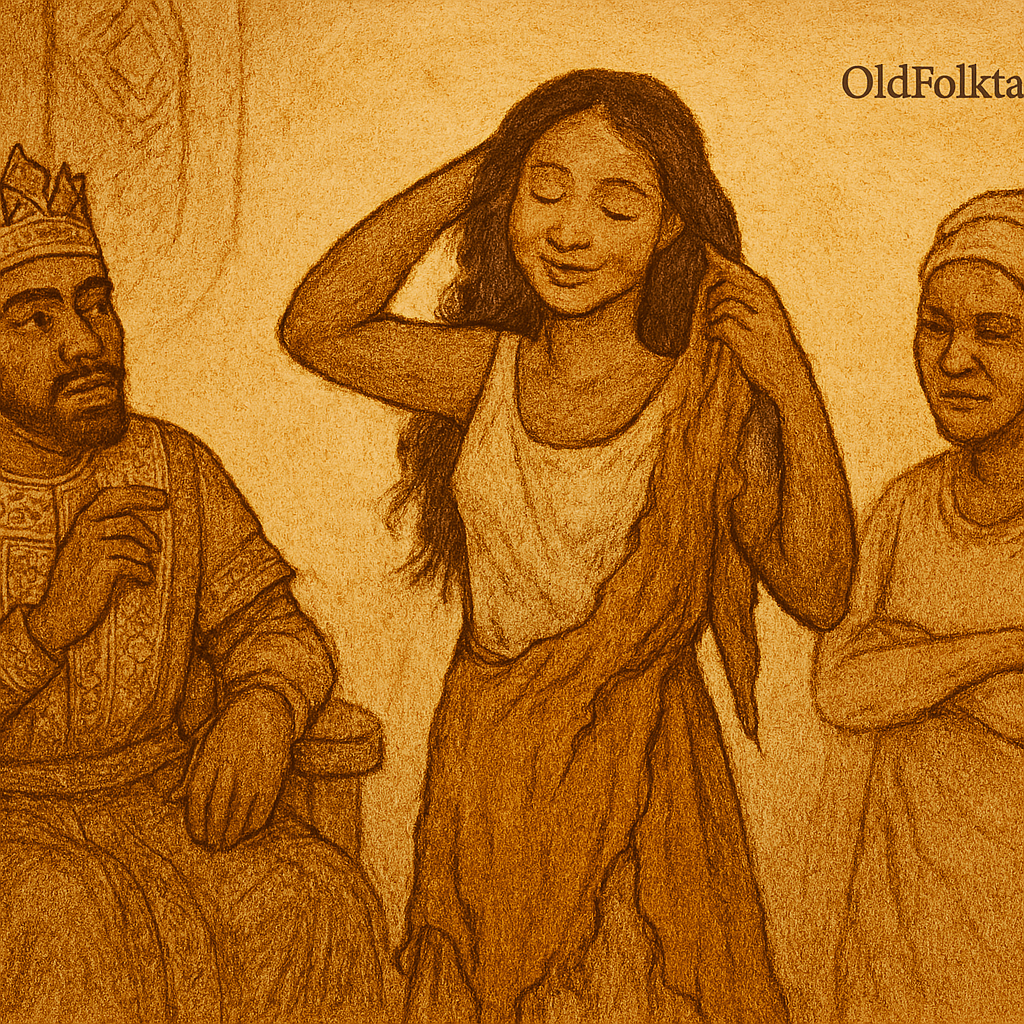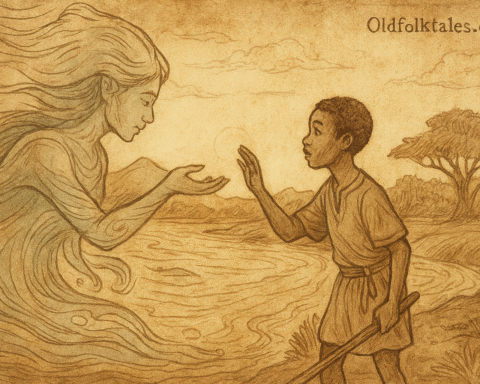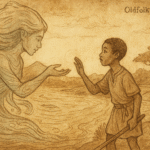In the ancient kingdom of Calabar, where the Cross River flowed like liquid silver through dense forests and thriving settlements, a mighty king named Eyamba. His name echoed with fear across battlefields, for his warriors were legendary and his strength in combat was unmatched throughout the land. The king’s palace stood like a fortress overlooking the river, its walls decorated with shields and spears that told stories of countless victories.
Yet for all his power and glory, King Eyamba carried a burden that weighed heavier than any crown. Though he had many wives, each chosen for her beauty and noble lineage, none had given him the son he desperately needed. The palace corridors, which should have echoed with children’s laughter, remained hauntingly quiet. His people gathered in worried groups at the marketplace, whispering their concerns about the succession. The elders approached the king with troubled faces, their voices urgent with concern.
“Great King,” they pleaded, bowing deeply before his throne, “you must marry the daughter of the wise spider. It is well known throughout our land that spider’s children are always many, and her wisdom runs deeper than the oldest rivers.” The king’s face twisted with disgust at their suggestion. He had seen the spider’s daughter, Adiaha, and her appearance was so unpleasant that he could barely look upon her without turning away.
Also read: Ituen and the King’s Wife
But King Eyamba did not know the extraordinary secret that Adiaha carried within her very being.
Each night, when darkness blanketed the kingdom like a soft cloth and the cock had not yet announced the coming dawn, something magical happened in Adiaha’s humble dwelling. As the last sounds of the day faded into silence, she would carefully remove what appeared to be her own skin, peeling it away like the outer shell of a fruit. Beneath this ugly exterior lay the most breathtakingly beautiful woman the world had ever seen. Her skin glowed with an inner radiance that seemed to capture moonbeams, her eyes sparkled like stars reflected in still water, and her smile could warm the coldest heart.
When King Eyamba finally agreed to meet with her, driven by desperation for an heir, he was prepared for disappointment. Instead, he found himself face to face with beauty beyond his wildest imagination. His heart, which had remained unmoved by the charms of countless other women, suddenly blazed with passion and wonder. Night after night, he eagerly awaited the darkness that would reveal his bride’s true form, and their love grew deeper with each passing moon.
But as dawn approached each day, like a spell that could not be broken, Adiaha would sadly return to her disguise. She would put on her ugly skin once more, transforming back into the unpleasant appearance that hid her true nature from the world. Then she would return to her simple home, carrying their secret love in her heart.
To everyone’s amazement and joy, Adiaha soon gave birth to a single baby boy. The child was perfect in every way, with his father’s strong features and an inner light that seemed to shine from within. The kingdom should have celebrated, but jealousy is a poison that spreads quickly through royal courts.
The king’s other wives, their hearts burning with envy and rage, could not bear to see this ugly woman receive the honor they believed should be theirs. In their desperation, they sought help from a wicked Ju Ju man, whose dark magic was feared throughout the region. This evil sorcerer prepared a terrible potion, mixing herbs and spells that would cloud the king’s mind and twist his thoughts.
When King Eyamba drank the cursed brew, his eyes became clouded and his memory grew foggy like morning mist. The jealous wives whispered poisonous lies into his ears, convincing him that his own son was a threat to the kingdom, a danger that must be eliminated before it could grow. In his bewitched state, the king believed their deceit. With a heart heavy with false fear, he took his precious son to the river’s edge and cast the innocent child into the flowing waters.
Adiaha’s cries of anguish echoed across the kingdom like the wails of a wounded bird. She wept until her tears seemed to join the very river that had swallowed her child, but what no one knew was that the powerful Water Ju Ju, spirit of the flowing waters, had witnessed this terrible injustice. With gentle hands, the Water Ju Ju rescued the drowning boy and carried him to a secret realm beneath the waves, where he would be raised with love and wisdom.
Years passed like flowing water, and Adiaha gave birth to a daughter as beautiful and perfect as her first child had been. But the cycle of jealousy and evil began again. The head wife, her heart still poisoned with envy, once more approached the wicked Ju Ju man for another cursed potion. Again, King Eyamba’s mind was clouded with false fears and twisted thoughts. Again, he cast his own child into the river, believing he was protecting his kingdom from danger.
Once more, Adiaha’s heartbroken cries filled the air, and once more, the compassionate Water Ju Ju rescued the innocent child. Now both children lived in the underwater realm, where they grew up strong, intelligent, and beautiful, learning ancient wisdom and developing extraordinary abilities under the spirit’s protective care.
When the time was right, and the boy had grown into a magnificent young man with muscles like iron and wisdom beyond his years, the Water Ju Ju decided it was time for truth to be revealed. “Go to the marketplace,” the spirit instructed, “and challenge the strongest men to wrestle. Show the people your strength, and let them see the resemblance you bear to their king.”
The young man emerged from the river like a vision, his powerful frame and noble features immediately drawing attention from everyone in the busy marketplace. When he announced his intention to wrestle, the strongest men in Calabar burst into laughter, for despite his impressive appearance, he was a stranger with no reputation. One by one, however, he threw these mighty warriors to the ground with such ease that it seemed like child’s play.
Word of this extraordinary wrestler spread through the kingdom like wildfire. People gathered from distant villages to witness his incredible strength, and many began to whisper about his striking resemblance to King Eyamba. The young man’s victories became legendary, and his fame reached the palace itself.
King Eyamba, intrigued by reports of this remarkable young wrestler, invited him to dine at the royal palace. Neither the king nor his jealous wife recognized the truth: that this strong, noble young man was the very son they had cast into the river years ago. The head wife, still beautiful but with a heart full of schemes, attempted to charm the visitor, but the young man, wise to her tricks through the Water Ju Ju’s teachings, kept his distance and remained politely aloof.
After the feast, the young man returned to his underwater home, where the Water Ju Ju declared that the time had finally come for complete revelation. “Gather your sister and your mother,” the spirit commanded, “for truth can no longer hide in shadows.”
At a great gathering that filled the marketplace with people from across the kingdom, the young wrestler stood before King Eyamba and all his subjects. The crowd held its breath as he brought forth a young woman of extraordinary grace and beauty: his sister, who had grown into a radiant maiden under the Water Ju Ju’s care.
Then came the moment that would change everything. Adiaha stepped forward, and before the amazed eyes of the entire gathering, she slowly removed her ugly skin, revealing her true form in all its magnificent beauty. The crowd gasped with wonder and joy, finally understanding the secret that had been hidden for so long.
With a voice that carried across the silent marketplace, the young man told the complete story: how their mother had been wronged by jealous wives, how he and his sister had been saved by the merciful Water Ju Ju, and how they had grown up in the spirit realm, preparing for this moment of revelation. The people listened with growing amazement, and the truth could no longer be denied or ignored.
King Eyamba’s joy knew no bounds when he realized that the mighty wrestler was his own son, returned to him by divine intervention. His heart overflowed with love and gratitude as he embraced his children and his true wife. The jealous wife was banished from the kingdom for her wickedness, her evil schemes finally exposed to all.
Adiaha was honored as the rightful queen, taking her place beside the king with dignity and grace. The kingdom celebrated with magnificent feasts that lasted for days, with music and dancing that could be heard for miles around. From that day forward, King Eyamba ruled with his beloved wife, his strong son, and his beautiful daughter by his side, and peace and happiness returned to the land of Calabar like sunshine after a long storm.
Moral Lesson
This powerful tale teaches us that true beauty and worth often lie beneath surface appearances, and that jealousy and deception ultimately fail when confronted with truth and justice. Adiaha’s patience and hidden strength, combined with divine protection, ultimately triumph over evil schemes. The story reminds us that goodness will be rewarded, families can be restored even after great suffering, and that appearances can deceive us about a person’s true nature and value.
Knowledge Check
Q1: What does Adiaha’s two skins symbolize in this Nigerian folktale? A: Adiaha’s two skins represent the dual nature of human existence and the difference between outward appearance and inner truth. Her ugly outer skin symbolizes how society often judges by surface appearances, while her beautiful true form represents the hidden worth and potential that exists within people, regardless of how they appear to the world.
Q2: What role does the Water Ju Ju play in this Calabar folktale? A: The Water Ju Ju serves as a divine protector and agent of justice, representing the Efik belief in water spirits as guardians of the innocent. This spiritual figure rescues the wronged children and ensures they grow up with wisdom and strength, ultimately facilitating the restoration of truth and family unity when the time is right.
Q3: Why is King Eyamba’s need for a son so important in this Nigerian story? A: In traditional Nigerian royal culture, having a male heir was essential for legitimate succession and kingdom stability. The king’s desperate need for a son reflects the cultural importance of patrilineal inheritance and the continuity of royal bloodlines, which was crucial for maintaining political power and social order in ancient African kingdoms.
Q4: What does the wrestling competition represent in the context of this folktale? A: The wrestling competition serves as a public demonstration of the young man’s strength and nobility, allowing the community to witness his royal qualities and resemblance to the king. In Nigerian culture, physical contests often serve to reveal character and worthiness, making this the perfect venue for the son to display his true nature.
Q5: How does this story reflect traditional Efik values about family and justice? A: The tale emphasizes core Efik values including the importance of family unity, the triumph of truth over deception, and the belief that divine justice will ultimately prevail. It shows that wronged family members will be restored, evil actions will be punished, and that spiritual forces actively protect the innocent and righteous.
Q6: What is the significance of the marketplace setting in this Calabar folktale? A: The marketplace represents the heart of community life in traditional Calabar society, where public recognition and social validation occur. By having both the wrestling matches and final revelation take place there, the story emphasizes that truth must be acknowledged publicly by the entire community, not just privately by individuals.





